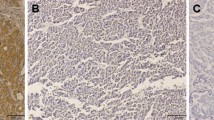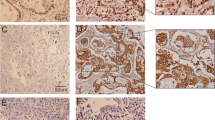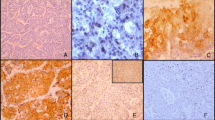Abstract
Background
Hypoxia-inducible factor-1 (HIF-1) is a transcription factor that plays a central role in biologic processes under hypoxic conditions, especially concerning tumor angiogenesis. Vascular endothelial growth factor (VEGF) is a potent proangiogenic agent and a multifunctional angiogenic cytokine in many malignant tumors.
Methods
This study was conducted to clarify the role of HIF-1 expression in gallbladder carcinoma. Thirty-one patients with gallbladder carcinoma underwent surgical treatment between 1994 and 2003 at the Department of Surgery, University of Tokushima, Japan. Both HIF-1α and VEGF were evaluated by immunohistochemistry, and correlations between the expression of these factors and clinicopathological features including prognosis were analyzed.
Results
Among 31 specimens from patients with gallbladder carcinoma, 22 (70%) and 9 (30%) were positive for HIF-1α and VEGF expression, respectively. Expression of HIF-1α was significantly correlated with stage, tumor curability, lymph node metastasis, venous invasion, hepatic infiltration, and lymphatic invasion (P < 0.05). The survival rate for patients with HIF-1α positive staining was significantly lower than that for patients with HIF-1α negative staining. However, VEGF overexpression did not correlate with clinical outcomes. We demonstrated that HIF-1α expression was associated with a malignant behavior risk category in gallbladder cancer.
Conclusion
Expression of HIF-1α was correlated with the poor prognostic indicators, such as lymph node metastasis and venous invasion. Therefore, HIF-1α could serve as an auxiliary parameter for predicting malignant behavior for gallbladder carcinomas.




Similar content being viewed by others
Abbreviations
- HIF-1:
-
Hypoxia-inducible factor-1
- VEGF:
-
Vascular endothelial growth factor
- GBC:
-
Gallbladder carcinoma
References
Shimizu H, Kimura F, Yoshidome H et al (2007) Aggressive surgical approach for stage IV gallbladder carcinoma based on Japanese Society of Biliary Surgery classification. Jpn Hepatobiliary Pancreat Surg 14:358–365
Lee YM, Lee JY, Kim MJ et al (2006) Hypomethylation of the protein gene product 9.5 promoter region in gallbladder cancer and its relationship with clinicopathological features. Cancer Sci 97(11):1205–1210
Tanaka S, Tanaka H, Yamamoto T et al (2006) Immunohistochemical demonstration of c-Kit protooncogene product in gallbladder cancer. J Hepatobiliary Pancreat Surg 13:228–234
Legan M, Luzar B, Marolt VF et al (2006) Expression of cyclooxygenase-2 is associated with p53 accumulation in premalignant and malignant gallbladder lesions. World J Gastroenterol 12(21):3425–3429
Todoroki T, Kawamoto T, Takahashi H et al (1999) Treatment of gallbladder cancer by radical resection. Br J Surg 86:622–627
Misra S, Chaturvedi A, Misra NC et al (2003) Carcinoma of the gallbladder. Oncology 4:167–176
Bos R, Zhong H, Hanrahan CF et al (2001) Levels of hypoxia-inducible factor-1α during breast carcinogenesis. J Natl Cancer Inst 93(4):309–314
Huang GW, Yang LY, Lu WQ (2005) Expression of hypoxia-inducible factor 1α and vascular endothelial growth factor in hepatocellular carcinomas: Impact on neovascularization and survival. World J Gastroenterol 11(11):1705–1708
Griffiths EA, Pritchard SA, Valentine HR et al (2006) Hypoxia-inducible factor-1α expression in the gastric carcinogenesis sequence and its prognostic role in gastric and gastro-oesophageal adenocarcinomas. Br J Cancer 96:95–103
Enatsu S, Iwasaki A, Shirakusa T et al (2006) Expression of hypoxia-inducible factor-1 alpha and its prognostic significance in small-sized adenocarcinomas on the lung. Eur J Cardiothorac Surg 29:891–895
Ito M, Tanaka S, Kim S et al (2003) The specific expression of hypoxia inducible factor-1α human gastric mucosa induced by non steroid and-inflammatory drugs. Aliment Pharmacol Ther 18(Suppl. 1):90–98
Seo Y, Baba H, Fukuda T et al (2000) High expression of vascular endothelial growth factor is associated with liver metastasis and a poor prognosis for patients with ductal pancreatic adenocarcinoma. Cancer 88(10):2239–2245
Duncan TJ, Al-Attar A, Rolland P et al (2008) Vascular endothelial growth factor expression in ovarian cancer: a model for targeted use of novel therapies. Clin Cancer Res 14(10):3030–3035
Quan ZW, Wu K, Wang J et al (2001) Association of p53, p16, and vascular endothelial growth factor protein expression with the prognosis and metastasis of gallbladder cancer. Am Coll Surg 193(4):380–383
Sumiyoshi Y, Kakeji Y, Egashira A et al (2006) Overexpression of hypoxia-inducible factor 1α and p53 is a marker for an unfavorable prognosis in gastric cancer. Clin Cancer Res 12(17):5112–5117
Miyake K, Yoshizumi T, Imura S et al (2008) Expression of hypoxia-inducible factor-1alpha, histone deacetylase 1, and metastasis-associated protein 1 in pancreatic carcinoma correlation with poor prognosis with possible regulation. Pancreas 36:e1–e9
Giatromanolaki A, Koukourakis MI, Simopoulos C et al (2003) Vascular endothelial growth factor (VEGF) expression in operable gallbladder carcinoma. Eur J Surg Oncol 29:879–883
Semenza GL (2003) Targeting HIF-1 for cancer therapy. Nat Rev Cancer 3:721–732
Chen WT, Huang CJ, Wu MT et al (2005) Hypoxia-inducible factor-1α is associated with risk of aggressive behavior and tumor angiogenesis in gastrointestinal stromal. Jpn J Clin Oncol 35(4):207–213
Klatte T, Seligson DB, Riggs SB et al (2007) Hypoxia-inducible factor 1alpha in clear cell renal cell carcinoma. Clin Cancer Res 13(24):7388–7393
Lidgren A, Hedberg Y, Grankvist K et al (2006) Hypoxia-inducible factor 1alpha expression in renal cell carcinoma analyzed by tissue microarray. Eur Urol 50:1272–1277
Giatromanolki A, Sivridis E, Simopoulos S et al (2006) Hypoxia inducible factors 1α and 2α are associated With VEGF expression and angiogenesis in gallbladder carcinomas. J Surg Oncol 94:242–247
Theodoropoulos VE, Lazaris AC, Sofras F et al (2004) Hypoxia-inducible factor 1α expression correlates with angiogenesis and unfavorable prognosis in bladder cancer. Eur Urol 46:200–208
Nadaoka J, Horikawa Y, Saito M et al (2007) Prognostic significance of HIF-1α polymorphisms in transitional cell carcinoma of the bladder. Int J Cancer 122:1297–1307
Mizokami K, Kakeji Y, Oda S et al (2006) Clinicopathologic significance of hypoxia-inducible factor 1α overexpression in gastric carcinomas. J Surg Oncol 94:149–154
Nikiteas NI, Tzanakis N, Theodoropoulos G et al (2007) Vascular endothelial growth factor and endolgin (CD-105) in gastric cancer. Gastric Cancer 10:12–17
Mobius C, Freire J, Becker I et al (2007) VEGF-C expression in squamous cell carcinoma and adenocarcinoma of the esophagus. World J Surg 10:1007
Bos R, Zhong H, Colleen FH et al (2001) Levels of hypoxia-inducible factor 1alpha during breast carcinogenesis. J Natl Cancer Inst 93:309–314
Birner P, Schindl M, Obermair A et al (2000) Overexpression of hypoxia-inducible factor 1alpha is a marker for an unfavorable prognosis in early-stage invasive cervical cancer. Cancer Res 60:4693–4696
Koukourakis MI, Papazoglou D, Giatromanolaki A et al (2004) VEGF gene sequence variation defines VEGF gene expression status and angiogenic activity in non-small cell lung cancer. Lung Cancer 46:293–298
Conflict of interest statement
The author has no conflict of interest.
Author information
Authors and Affiliations
Corresponding author
About this article
Cite this article
Batmunkh, E., Shimada, M., Morine, Y. et al. Expression of hypoxia-inducible factor-1 alpha (HIF-1α) in patients with the gallbladder carcinoma. Int J Clin Oncol 15, 59–64 (2010). https://doi.org/10.1007/s10147-009-0011-7
Received:
Accepted:
Published:
Issue Date:
DOI: https://doi.org/10.1007/s10147-009-0011-7




